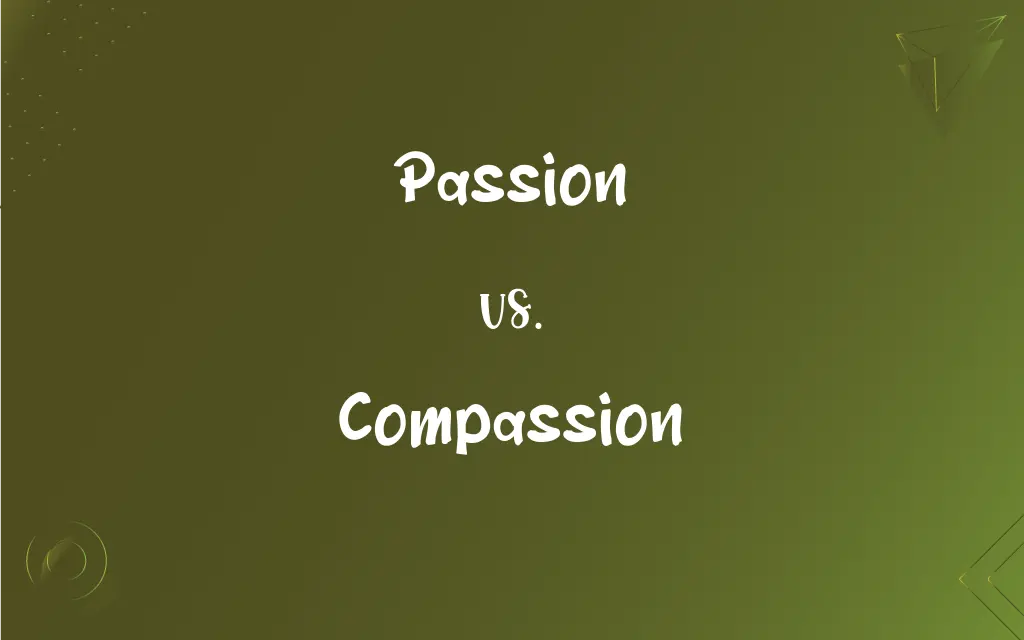Passion vs. Compassion: What's the Difference?
Edited by Janet White || By Harlon Moss || Updated on October 18, 2023
Passion is intense enthusiasm or desire for something, while compassion is sympathetic concern for the suffering of others.

Key Differences
Passion and compassion are powerful emotions, but they serve different purposes. Passion is a fervent interest or desire in a particular subject or activity. It's the fire that drives someone to pursue their dreams, work hard, or indulge in a hobby. It's that zeal you see in an artist who paints with all their heart or an athlete who trains relentlessly.
Compassion, on the other hand, pertains to empathy and caring. It's the emotion one feels when they see someone in distress and have the urge to help. Compassion pushes individuals to extend a helping hand to those in need, understanding their pain and wanting to alleviate it. It's that genuine concern one feels upon seeing a homeless person or a hurt animal.
Interestingly, while passion is often inward-focused – about one's interests, desires, and goals – compassion is outward-focused. Compassion is about understanding and empathizing with others, often putting their needs above one's own. Passion fuels personal achievements, whereas compassion fuels acts of kindness.
It's also worth noting that while passion can sometimes lead to obsession or extreme behaviors if unchecked, compassion generally promotes understanding and unity. A person with passion might relentlessly pursue their goals, sometimes at the expense of others, while someone with compassion will often prioritize helping others even if it means putting their desires on hold.
In essence, while both passion and compassion are strong and influential emotions, they guide human behavior in different ways. Passion drives personal pursuits and interests, while compassion motivates care, understanding, and assistance towards others.
ADVERTISEMENT
Comparison Chart
Nature of Emotion
Intense interest or desire.
Sympathetic concern for others' suffering.
Focus
Inward (personal desires and interests).
Outward (others' needs and feelings).
Outcome
Achieving personal goals.
Helping and understanding others.
Potential Downsides
Can lead to obsession.
Might lead to emotional burnout if not balanced.
Associated Behaviors
Pursuing interests fervently.
Offering help, understanding, and empathy.
ADVERTISEMENT
Passion and Compassion Definitions
Passion
A strong inclination towards an activity or subject.
His passion for astronomy had him stargazing every night.
Compassion
The humane quality of understanding suffering in others.
Acts of compassion uplift the human spirit.
Passion
A strong and barely controllable emotion.
Their passion for each other was evident to everyone.
Compassion
Sympathetic pity and concern for the sufferings of others.
Her compassion for homeless animals led her to start a shelter.
Passion
The suffering and death of Jesus.
The Passion is commemorated during Easter in Christian traditions.
Compassion
Kindness and understanding towards others.
He was known for his compassion, always offering a listening ear.
Passion
An intense enthusiasm or desire for something.
Her passion for music led her to become a renowned pianist.
Compassion
An emotion that motivates a desire to help.
Compassion moved her to donate generously to the charity.
Passion
A state of outburst of strong emotion.
The debate was conducted with both reason and passion.
Compassion
A deep awareness of and sympathy for another's suffering.
He showed great compassion towards the flood victims.
Passion
Strong or powerful emotion
A crime of passion.
Compassion
Deep awareness of the suffering of another accompanied by the wish to relieve it.
Passion
A powerful emotion, such as anger or joy
A spirit governed by intense passions.
Compassion
Deep awareness of the suffering of another, coupled with the wish to relieve it.
FAQs
Can passion lead to compassion?
Yes. For instance, a passion for human rights can lead to compassion for oppressed individuals.
Is compassion a form of love?
It can be seen as such. Compassion is a form of love that seeks to alleviate suffering.
Can passion become destructive?
If unchecked, extreme passion can lead to obsession or harmful behaviors.
Can someone have both passion and compassion?
Absolutely. One can be passionate about their interests and also show compassion towards others.
How can I cultivate more compassion?
Being mindful, understanding others' perspectives, and practicing empathy can foster compassion.
Is compassion a sign of weakness?
No, compassion is a strength, reflecting empathy and understanding.
How is passion different from love?
While both are intense feelings, passion often refers to interests or desires, while love is about deep affection.
Can one's passions be multiple?
Definitely. Individuals can have diverse interests and passions.
Is passion always positive?
While often seen as positive, unchecked passion can be detrimental.
How is compassion linked to altruism?
Compassion often drives altruistic behaviors, as one seeks to help others.
Can passion change over time?
Yes, what one is passionate about can evolve based on experiences and life stages.
Can too much compassion be harmful?
Overextending oneself due to compassion can lead to burnout, so balance is key.
How can compassion benefit society?
Compassion promotes understanding, unity, and supportive communities.
Why is passion important?
Passion can drive motivation, purpose, and achievement.
How can compassion impact mental health?
Compassion can boost well-being, but too much without self-care can lead to burnout.
Can passion be learned?
While innate, exposure and experiences can certainly ignite passion.
How can I show compassion daily?
Small acts of kindness, understanding, and active listening can display compassion.
Can passion be fleeting?
Yes, passion can ebb and flow based on experiences and circumstances.
How does compassion relate to empathy?
Empathy is understanding others' feelings, while compassion is the desire to alleviate their suffering.
Are there limits to compassion?
While compassion is valuable, setting boundaries is crucial to avoid emotional exhaustion.
About Author
Written by
Harlon MossHarlon is a seasoned quality moderator and accomplished content writer for Difference Wiki. An alumnus of the prestigious University of California, he earned his degree in Computer Science. Leveraging his academic background, Harlon brings a meticulous and informed perspective to his work, ensuring content accuracy and excellence.
Edited by
Janet WhiteJanet White has been an esteemed writer and blogger for Difference Wiki. Holding a Master's degree in Science and Medical Journalism from the prestigious Boston University, she has consistently demonstrated her expertise and passion for her field. When she's not immersed in her work, Janet relishes her time exercising, delving into a good book, and cherishing moments with friends and family.































































